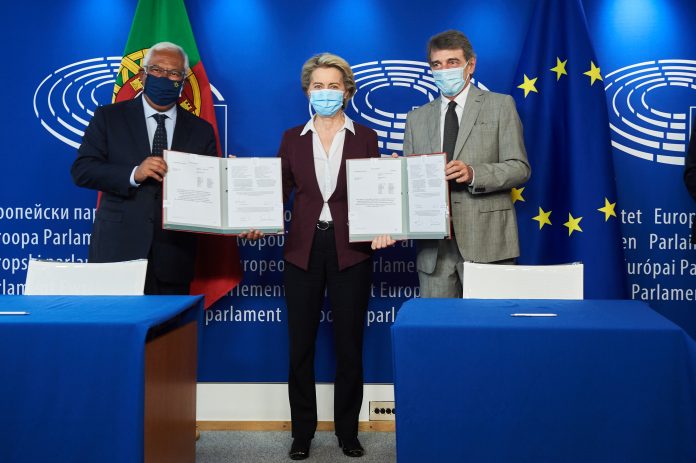Today (14 June) the Commission formally signed legislation to create the EU Digital COVID Certificate – which will be used for 12 months, beginning from 1 July, 2021
The European Commission has finalised plans for the EU Digital COVID Certificate, which is due to launch at the beginning of July. After this, all Member States will have six weeks to phase in the use of the documents – which can be used as digital or paper copies.
‘A symbol of what Europe stands for’, say leaders
Presidents David Sassoli and Ursula von der Leyen and Prime Minister António Costa said in a statement: “The EU Digital COVID Certificate is a symbol of what Europe stands for. Of a Europe that does not falter when put to the test. A Europe that unites and grows when faced with challenges. Our Union showed again that we work best when we work together.
“The EU Digital COVID Certificate Regulation was agreed between our institutions in the record time of 62 days.”
The EU leaders are keen to move away from the slowness of initial vaccination, which notoriously lagged behind that of the UK, Israel and the US due to Emergency Approvals taking significantly longer. This led to a feud between the drugmaker AstraZeneca and the Commission, due to unfulfilled contracts for doses at a time when President von der Leyen faced increasing pressures to speed up vaccination for the bloc.
The EU Digital COVID Certificate should not function to stop free movement across the bloc, so individuals who are not yet vaccinated should theoretically be allowed to travel.
While the EU launches a new system for citizens, it remains against the TRIPS waiver that would allow some countries to manufacture COVID vaccines. At the 2021 G7 meeting, leaders agreed to donate a further 870 million doses of COVID vaccine to countries which are nowhere near full vaccination, with some yet to begin. This amounts to 7.9% of the urgently needed doses across the globe.
It would take 11 billion vaccines to bring all countries in the globe up to 70% vaccinated, at which point the virus could technically be classified as contained. This percentage is necessary to stop further deaths and mutations.
The new Certificate should:
- Cover COVID-19 vaccination, test and recovery;
- Be free of charge and available in all EU languages;
- Be available in a digital and paper-based format;
- And include a digitally signed QR code.
Currently, Austria, Green, Spain and other countries are already connected to the new technical framework.
Writing about the general status of the EU’s technological advancements, Louise Grabo, President of the EESC‘s Observatory of the Digital Transition and the Single Market, said: “Unfortunately, the EU is one step behind countries like the U.S. and China when it comes to digitalisation.
“Despite the aims of the Lisbon Strategy from 2000 and the Europe 2020 strategy from 2010, the last two decades have been characterised by the slow adoption of digital technologies across the EU economy and a dwindling manufacturing and technology base.”
The EU is one of the first G7 countries to create a ‘vaccine passport’, raising the question of how and if this document will be created in other countries.












[…] was also a high-level proponent of the EU’s digital Covid-19 certificate – which records individuals’ coronavirus testing, vaccination, and infection history […]